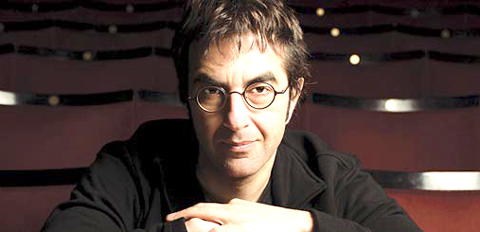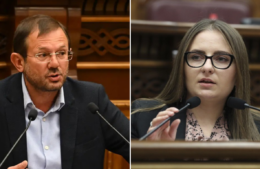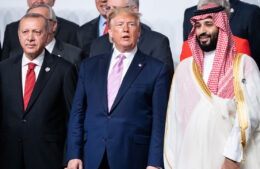Armenian genocide holds lessons for Canada, Atom Egoyan says
- (0)
Armenian genocide holds lessons for Canada, Atom Egoyan says –
‘The natural human tendency, unfortunately, is that if you can deny and get away with it, you will’
CBC News – The Armenian genocide has lessons for Canadians as they come to terms with trauma inflicted on indigenous people, Atom Egoyan says.
The Canadian Museum for Human Rights is marking the centennial of the Armenian genocide with a visit from the acclaimed Canadian filmmaker on Wednesday.
Egoyan, whose parents are Armenian, explored the genocide in his 2002 film Ararat, which starred Arsinée Khanjian, his wife. Egoyan and Khanjian will both speak at the museum Wednesday evening.
Egoyan spoke with Information Radio‘s Marcy Markusa about the Armenian genocide and the treatment of indigenous people in Canada on Wednesday morning. Read highlights of their conversation below.
Marcy Markusa: You, I know, are personally connected to [the Armenian genocide].
Atom Egoyan: On my father’s side, my grandparents were survivors. My grandmother really was found in a village at the age of about six, so we don’t really know where she’s from, and that’s where the family tree sort of ends on that side. So, it was something I was always aware of …
When we came to Canada, I was raised in Victoria, B.C., where there wasn’t really an Armenian community to speak of, so it was something that wasn’t really talked about a lot until I went to Toronto, and I realized that there was this whole history.
It’s a pretty grim history but the amazing part is that Canada had a huge role in actually welcoming Armenian refugees at the time to Canada and has actually acknowledged this officially as genocide, which has been a real bone of contention because the perpetrator, Turkey, has never really come to terms with this. It’s always denied the Armenian genocide.
MM: Have you ever come [face] to face with someone who’s denied it?
AE: Oh, yeah. It’s an odd situation because we take it for granted when something has happened historically that there will be some sort of reckoning at some point, but this is still very much an open wound and … one of the things that I’ll be talking about tonight is how that’s happened and how it’s been possible … unlike let’s say the Holocaust, where after the Second World War there were the Nuremburg trials and Germany was really made to acknowledge this and it was irrefutable, of course, because of all the documentation.
The Armenian genocide happened at this moment where it was possible because of various political pressures for Turkey to actually walk away from any acknowledgement.
It’s not usually someone who says, “It didn’t happen.” It’s someone who basically says, “Well, there have been exaggerations,” or “I’m sure there are two sides to the story.” There’s usually some way of equivocating. Of course when you meet someone who’s actually adamant about the denial, it becomes even starker than that. It’s a little surreal to be honest, it’s quite surreal.
You have to also understand when you meet someone who’s a young person who was raised in Turkey that they weren’t schooled with this.… A lot of them aren’t even aware of the history.
MM: Here in Canada a lot of people [are] not aware of the history either. So, 1.5 million Armenians died. What happened?
AE: Armenians were living in towns and villages all over the eastern part of Turkey.
There was a large community in what is present-day Istanbul. In 1915, the Turkish government, a “Young Turk” government at the time, decided to move large parts of the population into the deserts of what is present-day Syria.
Armenians were trying to assert their rights in terms of they were being overtaxed and they were being, there were all sorts of pressures. The basic political issue was that the Ottoman Empire at the time was crumbling.
The Young Turk government blamed the Armenians for a lot of what their problems were.… They were considered to be the root cause of why the empire was crumbling. The Turks thought that there was a possible coalition with certain Armenians with Russia, so they basically evacuated all these villages and what seemed to be at first … a forced relocation became an organized genocide. People were marched into deserts, where they were basically left to die. There were of course massacres and killings along the way, but our killing fields were in a place called Deir ez-Zor in Syria, where there are large crevasses in the mountains where Armenians were basically thrown into at the end of their journey.
When you’re bringing up history being forgotten and you’re talking about how when you go to Turkey you realize the education was never there … people didn’t have a chance to learn, [I can’t help] thinking about Canada as we come to terms with our own history with residential schools and treatment of aboriginal people. What have you learned about confronting denial that might shed some light on that?
The natural human tendency, unfortunately, is that if you can deny and get away with it, you will. This idea that there is a moral core that somehow prevents us from denying atrocity or crimes or wrongdoings that we do against fellow human beings, we tend to actually become quite lax.
MM: But at what point is there no excuse for ignorance?
AE: Well, in the case of being able to understand someone else’s suffering. That’s what it comes down to; it’s this question of compassion. It’s this understanding that we’re dealing with other human beings.
I think that one of the reasons that we’re dealing with the residential school issue is that we’re seeing the effect of this on present-day populations. We’re seeing the trauma. We understand that this is not just something that happened that we can sweep under the rug. This is a responsibility that we have as a society and we have to hold ourselves up to the very high standards of being able to address the wrongs that we have done.



















